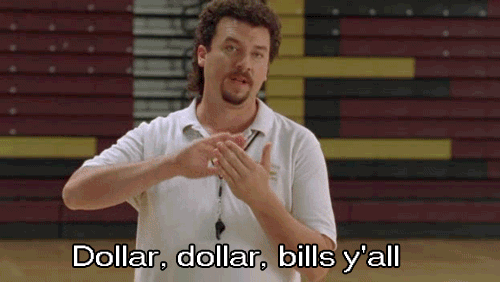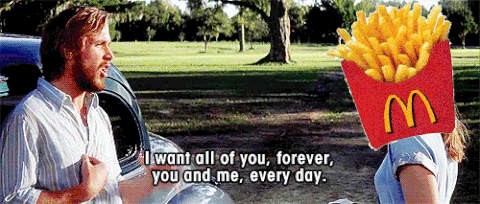Having someone in your life who’s a different nationality can be an enlightening experience – especially when they visit your natural nation and you get to witness their reactions to everything you’ve grown desensitized to over time. This is the case for me right now, as my Italian-with-a-Brazilian-citizenship-studying-in-the-UK partner is visiting me in California. It’s a never-ending exchange of our respective experiences, histories, and cultural norms.
Here in the US of A, we are particularly susceptible to believing our experiences are universal. For my fellow Americans who don’t have much experience outside of our 50-state bubble, here’s a list of reality checks that might make you rethink a few things (with help from my partner, Laura):
1. The Ultimate Nationalism
We don’t think of ourselves as frighteningly nationalistic; we call ourselves “patriotic” instead. But take a moment to consider the facts: all our children learn not one but a myriad of nationalistic pride songs (“America the Beautiful,” “The Star Spangled Banner,” “This Land Is Your Land,” etc), we grow up reciting a pledge of obedience to our country every day in the classroom, and an uncomfortable number of Americans seem to genuinely believe that we are objectively the greatest country in the world… despite being 14th in education, 19th in national satisfaction, and 44th in health care (yikes), among other spectacular failures. We are 1st in number of prisoners, both per capita and total, so... yay for us, I guess.
Oh, and the flags. Jesus christ, the flags. Ask your closest non-US-based friend how many national flags they see on an everyday basis. My resident foreigner has been keeping count of how many American flags we see each day we go out. Without counting the times we see the same flags twice, mind you, we’ve so far been averaging approximately 94.19 distinct US flags per day. Who, exactly, is so forgetful that they need to be reminded we’re in America (AND PROUD!) six hundred times in an hour’s drive?
2. Drive-Thrus
I think sometimes Americans forget that many other countries don’t have such a car-centric culture—especially those of us in big states like California or Texas. That means that drive-thru everything isn’t a thing. Fewer drive-thru restaurants, drive-thru pharmacies, drive-thru… liquor stores? Right, yeah, we do, in fact, have those too. For us in the US, road culture is a much more common phenomenon. We want everything fast, cheap, and on wheels.
3. Creationism in Schools
Yeah, in case it wasn’t clear, pretty much nowhere else actually allows religion-based theories like creationism to be taught in public schools. Italy has the Pope and it still doesn’t. Honestly, for a country apparently founded on the basis of religious freedom, we suffer heavily from religious fundamentalism and extremist religious groups. According to one statistic, more Americans believe in the devil than in evolution.
Religious beliefs are no crime, obviously. However, when the Westboro Baptist Church is alive and well but children aren’t allowed, in many places, to be taught things like sex ed or evolution (without accompanying creationist principles), that’s something I would consider a problem of priorities.
4. Children’s (Lack of) Amnesty
For a country that is practically a teenager itself, we really treat our juveniles badly. It’s unheard of in many places for minors to be arrested, much less subject to adult penalization for a variety of crimes, but it’s commonplace here. New York state only recently repealed its law allowing for 16-year-olds to receive majority sentencing. It is also quite normal for our youth to work part-time or during summers, which is not so typical elsewhere. So, we work our kids like adults, sentence them like adults… but do they have the rights of a full citizen? Not by far. The US is one of the only countries left in the world that hasn’t ratified the United Nations’ Convention on the Rights of the Child, for instance. You want to know our justification why? We didn't want to give up the right to execute minors. Um...
5. Ammo, Ammo, Everywhere!
No, it’s not just liberal propaganda… it really is extreme how out-there America’s gun culture is compared to... well... almost anywhere else. For the rest of the world, there’s about 1 gun per 10 people alive. For us, the ratio is 9:10. It’s not the norm in most so-called “developed” nations to see people walking around toting handguns—cops included. It’s an out of the ordinary thing. Here, gun ownership is so common that it’s an actual trope that every suburban dad has a shotgun under his bed that he keeps to threaten his daughter’s dates (which is fucked up on a variety of levels). Do you wonder why we have more gun violence and school shootings per capita than the rest of the world? I don’t.
6. It’s a Rich Man’s World
Okay, Americans aren’t exclusively cash-laden, but we do treat a lot of money issues very differently from other countries. For instance, most other places advertise their prices with tax included. Visitors to the US often feel robbed when they pick up something that’s a steal at $3.99–only to find that there’s an extra few percent tacked on at the register. Rude! Oh, and the way we talk about money is different too. People here are actively discouraged from sharing their salary with other peers at work, and it is considered rude to talk about how much money one does (or doesn’t) make. It’s a very secretive topic of conversation, which is interesting considering how much we rely on it for everything, from hospital fees to university tuition. We’re constantly indebting our citizens, but god forbid we talk about it.
7. That Old-school Puritanism, Tho
What’s with some of the Puritan values we keep toting? We have an atypically high age minimum for drinking, and are much more culturally strict about drinking, too – like no drinking in public, or not even half a glass of wine while pregnant. This might seem like a good value, but consider this – children who grow up with a moderate familiarity with alcohol are less likely to indulge in secretive and dangerous alcoholic binges and other bad habits associated with underage drinking, like drinking and driving or not knowing basic booze safety.
We also have a huge fixation on nudity and modesty. For a culture whose media empire is practically built on the oversexualization (and simultaneous infantilization) of our models and celebrities, we are super strict about things like nipples or nudity in films, as well as cursing. We’re also much more top-covered at beaches in general, and often have higher ages of sexual consent; plus, we fear bralessness to a neurotic extent, and then fear bras, too: like when we punish girls in school for having their bra straps showing. Very sensible, America.
8. Workaholism
Americans love to party, right? We’re constantly producing new movies and TV shows, merchandising anything we can get our hands on, and inventing new forms of excitement for recreation. In reality, though, we’re significantly more focused on work life, careers, and so-called productivity than the average anywhere-else-er. For instance, our service industry is practically a parody of itself. We put up with the pain of retail jobs where cashiers are actually not allowed to sit down, but the truth is, the rest of the world is fine with it. Health is considered more important than looking attentive at all times.
We also have fewer vacation days, less health leave, no guaranteed maternity leave, shorter lunches, and so on. What’s up with this working obsession? Maybe it’s partially to do with the need for more cash to make up for lack of free healthcare, childcare, and tuition; but culturally speaking, the American Dream is also big fuel for the infectious idea of working hard to achieve bigger, more, better, all the time.
9. Super-Size Me, Baby
Yes, the media doesn’t lie. We have a super extra food culture. As a fast food addict myself, I can’t place too much judgment on our fondness for restaurants that are cheap and fast. But it’s definitely true that other countries marvel at how utterly huge our portions are, with so little nutrition to be found. (Maybe we’re supposed to get it from the unlimited refills?) It’s also not the norm to have a specific extra menu of foods that children eat – at least not after their teeth are grown in. Have you ever really looked at the difference between child and adult menus at a mid-range restaurant and wondered why we feed our kids different things than a healthy adult? While plainer and tastier foods make a lot of sense to please the young’uns, it’s a little strange that we feed our growing and vulnerable children cheaply produced masses of color and corn syrup instead of, like… food.
It should especially be noted here that cheap, unhealthy food isn’t a universal dictate here in the US, either. It’s largely marketed to the underprivileged and overworked-- disadvantaged classes who don’t have the time or money to procure healthy, home-cooked meals. Other countries are much more likely to have inexpensive and accessible produce and basics, locally sourced, than we are in the states. We also have significantly fewer regulations on what can be put in food products, and place a big premium on bright colors and marketing where other countries would be more attracted to a organic-looking, home-grown aesthetic.
10. Litigation Central
It can sometimes be a good thing that US citizens have such success in civil courts; it is often the origin of warning labels, consumer protections, and other laws that wouldn’t be in place were it not for customer complaints. But it’s also the battleground for so many “frivolous” lawsuits that it’s a cultural trope—and one very specific to America. Most other countries wouldn’t dream of ever seeing an advertisement for lawyers on a roadside billboard or television, but for us, it’s the way to go. Suing is how you get things done. Let’s just say it’s a little… roundabout of a path to justice, but okay.
...and plenty more.
These are just some of the things that other countries find odd about America. Laura’s list of things I didn’t get around to including has such entries on it as excessively gendered products, weirdly gapped bathroom stalls, anti-vaccination rhetoric, Americentric racial structures, the freedom in name changes, not thoroughly learning foreign languages, watching lots of TV past the age of 9, use of the Imperial system, disinterest in other cultures, and more. Undoubtedly there’s a lot that makes the United States a unique sovereign entity, some of it funny and other bits… genuinely worrying.
So what’s a born-and-bred American to do?
Just be critical, kids. And I don’t mean criticism as in negativity, I mean as in critical thinking—ask questions about the way things are, talk to people from places you’ve never been, and listen to other perspectives. Just because something is the way you are used to doesn’t mean it’s the only way, and just because it’s a norm doesn’t always mean it’s right.




























